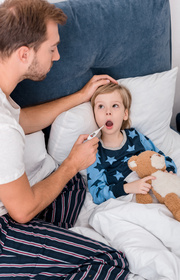When Your Child Should See a GP: Recognizing the Signs of Health Concerns
As a parent, your child’s health and well-being are among your top priorities. While children can experience occasional minor illnesses, recognizing when it’s time to visit to a general practitioner (GP) is necessary. Understanding the signs of health concerns and knowing when to seek medical attention ensures your child’s continued health and development.
It is our desire to support you as a parent for your own peace of mind, but more importantly, your child’s well-being. We are not health professionals. You should always consult your local health authorities before prescribing unknown remedies or over the counter medications. With that being said, we did a little research to explore when your child should see a GP and provide guidance on recognizing the signs of potential health issues.
1. Persistent Fever
Fever is a common symptom in children and is often caused by viral infections. However, if your child’s fever persists for more than a few days, is very high (above 104°F or 40°C), or is accompanied by other concerning symptoms, such as lethargy, difficulty breathing, or a rash, then it’s time to consult a GP. A persistent fever may indicate a more significant underlying issue that requires medical evaluation.
2. Skin Abnormalities
Skin issues in children, such as persistent rashes, hives, or unusual growths, may require medical attention. Some skin conditions can be indicative of allergies, infections, or underlying medical conditions. If you notice any concerning changes in your child’s skin, consult with a GP at TapGP for an evaluation.
3. Unexplained Pain
Persistent or unexplained pain in children should be addressed by a medical professional. Whether it’s abdominal pain, headaches, joint pain, or any other type of discomfort, consult with a GP to determine the cause and get appropriate treatment.
4. Behavioral and Developmental Concerns
Behavioral and developmental concerns in children shouldn’t be overlooked. If you notice significant changes in your child’s behavior, mood, or developmental milestones, it may be advisable to consult with a GP. Conditions such as attention deficit hyperactivity disorder (ADHD) or developmental delays may require early intervention for better outcomes.
5. Frequent Infections
If your child frequently experiences ear infections, throat infections, or urinary tract infections, it may be a sign of an underlying issue. A GP can assess your child’s immune system and overall health to identify potential contributing factors.
6. Growth and Weight Concerns
Significant changes in your child’s growth, weight, or appetite can be indicative of underlying health concerns. Consult a GP if you have concerns about your child’s growth trajectory or if they exhibit sudden or unexplained changes in appetite or weight.
7. Mental Health and Emotional Issues
Good mental health and emotional well-being are vital for children’s overall development. If you notice signs of anxiety, depression, extreme mood swings, or behavioral problems in your child, it’s essential to consult with a GP. They can provide guidance, referrals, or interventions to support your child’s mental health.
8. Routine Check-ups and Vaccinations
Regular well-child checkups with a GP are crucial for monitoring your child’s growth and development. These visits also ensure that your child receives the recommended vaccinations and preventive care to maintain good health.
In conclusion, recognizing when your child should see a GP is vital for ensuring their health and well-being. While some symptoms may resolve on their own, persistent or severe signs of health concerns shouldn’t be ignored.
Consulting with a GP in a timely manner can help diagnose and address potential issues, provide appropriate treatment, and support your child’s long-term health and development. Remember that early intervention and proactive healthcare are key to helping your child thrive.






 Explore the Safe Search Engine -
Explore the Safe Search Engine -